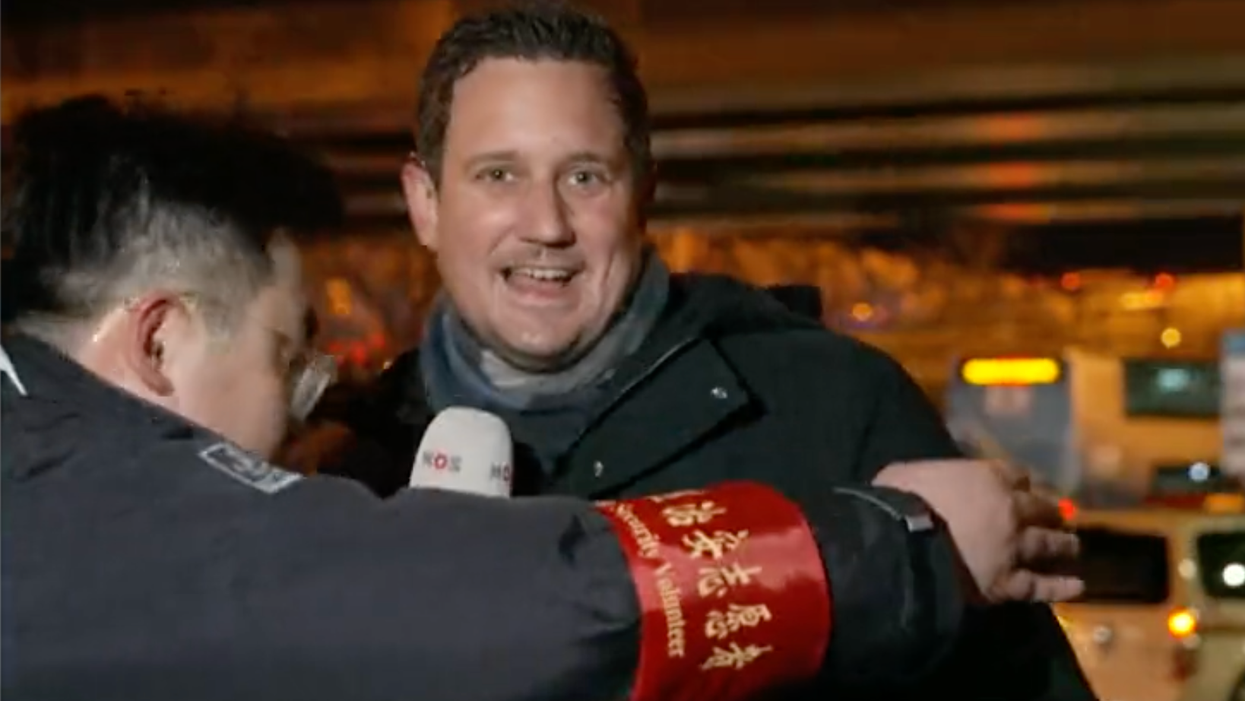An Olympic Guard Yanked A Reporter Off Live TV & China Still Hasn't Said What He Did Wrong
"I think someone was being overzealous."
Watching reporters present live news isn't always exciting, except for when they get dragged off the screen by a shouting stranger.
That's exactly what happened to a Dutch reporter for NOS during the opening ceremony of the Beijing Olympics on Friday, after a Chinese security guard barged into his shot and pulled him away.
The reporter, Sjoerd den Daas, grappled with the guard for a few moments during the awkward on-air moment, which NOS later shared online.
Onze correspondent @sjoerddendaas werd om 12.00u live in het NOS Journaal door beveiligers voor de camera weggetrokken. Helaas is dit steeds vaker de dagelijkse realiteit voor journalisten in China. Hij is in orde en kon zijn verhaal gelukkig een paar minuten later afmakenpic.twitter.com/GLTZRlZV96— NOS (@NOS) 1643978080
"I think someone was being overzealous," IOC spokesperson Mark Adams told Reuters, referring to the guard.
"These things do happen and I think it's a one-off. I hope it's a one-off and we will assure you that within the closed loop you will be able to carry on your work."
Den Daas later took to Twitter to address what had happened and explain his side of the experience.
Thanks to all who have been following the incident last night during the Beijing Olympic Opening Ceremony. I wanted to clarify some facts about what happened.https://nos.nl/l/2415837— Sjoerd den Daas (@Sjoerd den Daas) 1644061125
Although the IOC claims that this was an isolated incident, den Daas thinks otherwise.
According to den Daas, the police directed him and his team to a sealed-off area where they began filming a little before 7 p.m. They followed all the police orders and went exactly where the police told them to go.
Pretty much right after going live, den Daas recalls being "forcefully pulled out of the picture without any warning by a plainclothes man wearing a red badge that read: 'Public Safety Volunteer.'"
While the commotion was going down, another person took NOS's light installation.
When den Daas' team asked what they had done wrong, the Chinese security officer could not give them an answer.
Den Daas and his team were eventually able to continue filming from a parking lot around the corner from where they were initially situated.
He said it's just one of several incidents involving police giving journalists a hard time in China.
"In recent weeks, we, like several foreign colleagues, have been hindered or stopped several times by the police while reporting on subjects related to the Games. Therefore, it's hard to see last night's incident as an isolated incident, as the IOC claims."
Marcel Gelauff, NOS's editor-in-chief, lumped the incident in with China's ongoing censorship of free speech and journalists.
"Unfortunately, situations like this are increasingly becoming a daily reality for journalists in China," said Gelauff. He added that it's "a painful illustration of the state of press freedom in the country."
